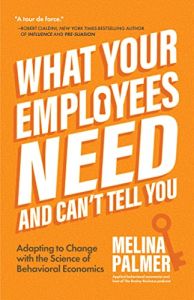Join getAbstract to access the summary!

Join getAbstract to access the summary!
Melina Palmer
What Your Employees Need and Can’t Tell You
Adapting to Change with the Science of Behavioral Economics
Mango Publishing, 2022
What's inside?
How people’s brains work – and how to help them embrace change.
Recommendation
People embrace change all the time – new phones, new apps, new platforms. Change itself isn’t the problem, it’s the way people’s brains react to it sometimes that causes resistance and failures. Behavioral economist Melina Palmer explains how her field is yielding powerful insights into the reasons people rebel against change, and lightens her conclusions with engaging personal stories. An accessible, actionable guidebook to getting smarter about change management.
Summary
About the Author
Melina Palmer is a behavioral economist. She is CEO of The Brainy Business, providing behavioral economics training and consulting around the world, and host of The Brainy Business podcast. Palmer teaches at the Texas A&M University’s Human Behavior Lab.


















Comment on this summary